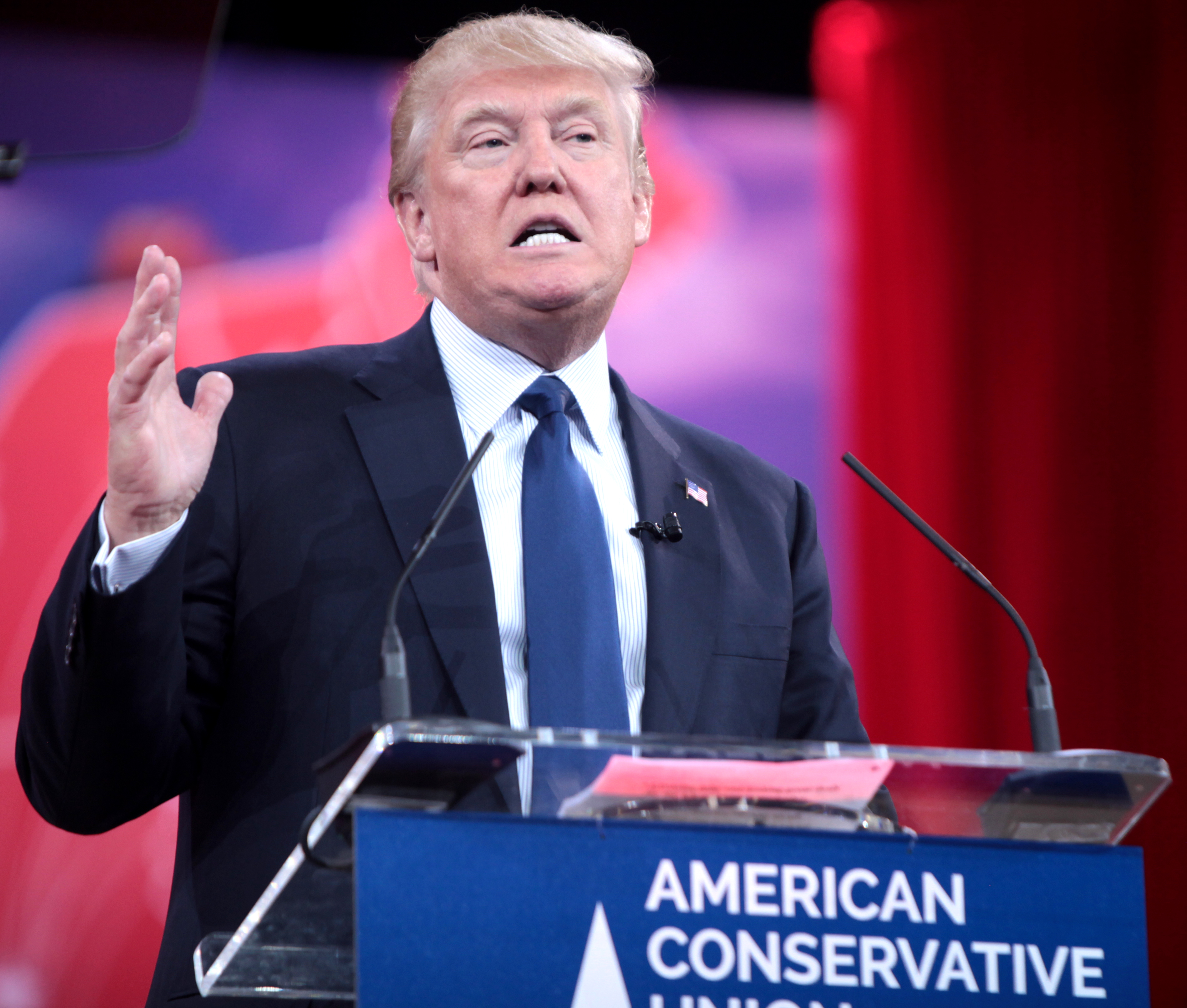by Khalid Alshaikh
At a speech on the final day of the Republican National Convention, Donald Trump stated that he is “going to defeat the barbarians of ISIS.” Trump vowed to work with American allies to destroy the terrorist group if he was elected to the White House.
Trump’s words seem on the surface to agree with the strategy adopted by the Obama administration. President Obama himself, after all, wrote in the introduction of the 2015 National Security Strategy that the goal of the United States government is “to degrade and ultimately defeat the Islamic State of Iraq and the Levant.”
If the endgame is the same, why do some of us disagree with Trump’s position? Trump’s approach to terrorism is different because he is not offering real solutions but merely providing emotional comfort to his supporters. His proposal to ban foreign-national Muslims or go after terrorists’ families satisfies the anger many people in this country feel regarding ISIS and its barbaric acts.
Yet, a dilemma emerges once we try to synthesize Trump’s statements into a coherent practical strategy to fight ISIS.
On the one hand, he wants to destroy ISIS by working with U.S. allies. On the other hand, he wants to ban people from entering the United States based solely on their religious identity. It is hard to imagine U.S. allies in the Middle East (such as Turkey, Saudi Arabia, Iraq, Jordan and Egypt) sacrificing their soldiers to destroy ISIS while at the same time their regular citizens are barred from entering this country.
Terrorism ultimately does not recognize borders, and Muslims are also victims of the Jihadists. I still remember when terrorism hit my hometown of al-Khobar, Saudi Arabia. Al-Khobar is a city located on the eastern coastline of Saudi Arabia. It was modernized with the help of American workers who arrived in the 1930s. Many of them chose to stay, keeping their American culture and values with them.
When Osama Bin Laden’s organization, Al Qaeda, started to target the Saudi police and expats residing there, the Americans started to leave. Back in 2004, while I was taking a final exam at my high school, I noticed one of my friends was missing. A terrorist attack targeting a compound had trapped him in his home. The compound was only a couple hundred yards away from my school. That experience filled me with rage and anger against the Jihadists who targeted my friends, my country and my fellow human beings. In some nations, such as Iraq, terrorism has become the norm.
What Trump is ignoring in his declared mission to destroy ISIS is that Muslims are the cure for this global Jihadist insurgency. Muslim theologian Usama Hasan issued a fatwa in 2014 against ISIS stating that “persecution and massacres of Shia Muslims, Christians and Yazidis is abhorrent and opposed to Islamic teachings.” He also obliged Muslims to “actively oppose its poisonous ideology.”
Several months ago, KPSU interviewed Muslim feminist Asra Nomani, and she called upon fellow believers to resist fundamentalist and extremist ideology. Here in Portland, Harris Zafar, the leader of a local Muslim community, wrote for the Oregonian, saying that “halting the expansion and popularity of ISIS requires involvement of all parties, including Western nations as well as Muslim nations.” Zafar added, “With its military, diplomatic and economic might, the United States certainly does have a role to play in bringing ISIS to justice.”
While Muslim community leaders are agreeing with Trump that ISIS ought to be destroyed, his emotional statements often fail to see the nuances of the problem. For the sake of satisfying an angry voter base, Trump continues to play into the ISIS narrative that there is a war between Islam and the West. More dangerously, Trump’s illiberal ideas of banning Muslims from entering this country or targeting terrorists’ families challenges the core principle values of the United States.
By viewing people collectively through their religious identity and not by their individuality, Trump alienates his potential allies in the Middle East and among the Muslim community in the United States, while simultaneously damaging the very character of what it means to be American.
Originally from Saudi Arabia, Khalid Alshaikh is currently studying political science at PSU.








Calling ISIS ‘ISIL’ is a stand against Isreal. Is this your stand? The barbarism of ISIS is the barbarism of Mohammed. For example, he himself helped behead 800 or more Jews because they would not convert to Islam. With Mohammed’s warlord example, how can you say the barbarism of ISIS has nothing to do with Islam? How many countries that were once Christian are now Muslim because of the sword of Islam? I understood that to not follow the word of the Koran was blasphemy and punishable by death. If the Koran reaches barbarism, hate of Jews, intolerance to all but Muslims, how can there be reform? If a Muslim’s first obligation is to be to Allah, how can they respect the American constitution and support American values?
Christine , thank you for your comment. However, since the word ISIL and Israel does not appear in the article , I fail to see the relevant it has to the article. Muslim theologians have different views about Jews and Christians, and Muslim obligations. For instance, Usama Hassan , the sheikh I quoted in this article , does not hold the views you stated. Likewise, Ultra-orthodox Jews , Orthodox conservative Jews, and Reformed Jews do not hold the Jewish law in the same way. I am not denying that Radical Islamists wouldn’t subscribe to views similar to the one you wrote about, but it is also disingenuous to reject other interpretation of the same religion by other groups. For instance, mainstream Catholicism accept the theory of evolution and the Big Bang while fundimitalist evangelicalism subscribe to Creationism. We cannot therefore conclude that Christianity and its sects hold the same views on Creationism. Thank you
It’s great to see opinion writers engage with readers. Thank you, Khalid.
In my last comment it should read ‘ if the Koran ‘teaches’ barbarism’ etc
In defense of the sane people….
Trump literally exhibits all traits of a sociopath: Superficial charm and glibness; manipulative and conning; grandiose sense of self; narcissism; pathological lying; lack of remorse, shame or guilt, shallow emotions; incapacity of love; need for stimulation; callousness and lack of empathy; poor behavioral controls / impulsive nature; early behavioral problems; irresponsibility and unreliability; criminal or entrepreneurial versatility; contemptuous of those who seek to understand them; does not perceive anything is wrong with them; authoritarian; secretive; paranoid; seeks situations where tyrannical behavior will be tolerated, condoned or admired; goal of enslavement of their victims; ultimate goal is the creation of willing victim; incapable of real human attachment to another; may state readily that their goal is to rule the world
Thank you, Khalid, for this thoughtful and well-written piece. The problem many of us non-Muslim Westerners have is that the Wahhabist version of Islamic theology has seriously compromised the common ground that ordinary Muslims have with ordinary non-Muslims in Western countries. If there were more outspoken Asra Nomanis, things would improve greatly, but we need *many* more Asra Nomanis.
Frank, I agree with you. Radical Islamists do not hold liberal ideas, such women rights, secularism and Freedom of speech and religion (as was outlined recently in a new book called Islamic Exceptionalism by Shadi Hamid) . People from the Muslim Reform Movement and Quilliam foundation, and even the Ahmadiyya community, are doing great job to counter fundamentalism by preaching Enlightenment principles. And we ought to support them.
I’m posting this again because my comment was previously deleted by the editors at the Vanguard who apparently had a change of heart but not before this specific response was deleted.
If you – Khalid – say this “Radical Islamists do not hold liberal ideas, such women rights, secularism and Freedom of speech and religion.” What do you have to say about your native country of Saudi Arabia and most other Muslim majority nations who do not hold the values you pointed to? Are they in fact radical Muslim nations?
This article is just another disingenuous hit piece at best, this statement specifically “On the one hand, he wants to destroy ISIS by working with U.S. allies. On the other hand, he wants to ban people from entering the United States based solely on their religious identity.” This assumes that Mr. Trump’s statements are mutually exclusive; they are not. The statements made by Trump explained this in a clear and concise manner that was easy to understand but apparantly missed by Mr. Alshaikh.
Source: http://customwire.ap.org/dynamic/stories/U/US_CAMPAIGN_2016_TRUMP_TERRORISM?SITE=AP&SECTION=HOME&TEMPLATE=DEFAULT
Trump said that he would be working with US allies militarily and implement tighter restrictions on who we allow into this country from war torn regions of the middle east; so we have an opportunity to figure out who these migrants are and about their specific intentions, including whether they will positively add to our culture. These are basic practices already put in place by many nations all around the world.
Source: http://news.nationalgeographic.com/news/2013/06/130630-immigration-reform-world-refugees-asylum-canada-japan-australia-sweden-denmark-united-kingdom-undocumented-immigrants/
I also find the narrative that muslims are the biggest victims of terrorism; while statistically this is a fact, nowhere in this article does it address the sectarian violence between sunni and shia which is the main reason for the bloodshed in the first place; violence that predates western intervention in its entirety and lends itself to the often negative views of islam held by western cultures; and rightly so.
Source:
http://www.cfr.org/peace-conflict-and-human-rights/sunni-shia-divide/p33176#!/?cid=otr-marketing_url-sunni_shia_infoguide
Just another poorly written opinion hit piece without any real substance.
Daniel , thank you for taking the time to read and attempt to rebut my poorly written opinion hit piece which lacks substance , according to you. To begin in responding to your comment , I must first state that my opinion predate Trump’s foreign policy speech and was written right after the RNC. I also want to point out that I did not attack Trump but criticized his policy based on his previous statements.
I must confess, also, that It was great to see how Mr.Trump is modifying , and will continue to modify, his policy on banning muslims from entering the United States, the more he discovers how unpractical that view is. The article that you sent is just a good example on how he shifted his position since his first statement on the issue when he stated “Donald J. Trump is calling for a total and complete shutdown of Muslims entering the United States until our country’s representatives can figure out what the hell is going on.” It is also worth noting that he revisited this statement by claiming that it was “only a suggestion.” But even in the article that you shared , the proposal of religious tests are still contrary to the American spirit.
First, the United States government should not tolerate the establishment of any religion in the government and therefore any attempt to to exclude a religion or religious practices from this country would open a door to challenge freedom of religion in the U.S. The government, simply speaking, has no business in regulating which religious beliefs are to be practiced and which are not. In illiberal and authoritarian countries that is the case. The role of the government in the U.S , however, is to protect the freedoms of the individual living or visiting the United States. Second, the religious tests opens a wide door to the government to interfere with religious beliefs even within religious sects in this country. Many evangelical churches , for instance, do not believe in same sex marriages ; Catholics are strong opponent of non traditional birth control; Mormons believe in polygamy…etc . Banning a muslim who do not believe in same sex marriage from entering the country while at the same time allowing fundamentalist Christians the right to oppose it would seem to indicate that the United States tolerate one group of religions while opposing another group even when both groups believe in the same thing (in this case opposing same sex marriage).
Finally, the Sunni-Shia divide , indeed predate the US intervention. And like you , I would criticize attempts to blame the US for the situation in the Middle East. Nevertheless, there is no doubt that the level of sectarian violence in the region has increased dramatically after the invasion of Iraq in 2003. The number of Sunni and Shia quarrels in the 1990s was minimal if any. and in the 1980s , the Iraq-Iran war was a war between an anti-west Islamist regime (the Iranian regime) and an Arab Nationalist regime (the Iraqi regime) which sought to protect its own interest by Canceling the Algiers Accord of 1975. This is why countries such as Libya and Syria sided with Iran (despite being Arab) while the other majority Arab countries along with the United States sided with Iraq; Iran wanted to export the revolution and replace the gulf state monarchies with anti-western regimes and this was unacceptable to the United States. The Iraqi army, at the time, was made up mostly of Shias. In an interview with Al Jazeera Arabic, Paul Bremer stated that “by taking Saddam Hussein out of power we had overturned the sunni domination of mesopotamia that have been there for a thousand years.”Therefore, we can conclude that unnatural change of regime in Iraq produced sectarian violence and that sectarianism was used by other countries to increase their sphere of influence. The results is chaos and destabilization in the Middle East. Even Mr. Trump would agree with this statement and criticized Republicans for the Iraq War.
https://www.youtube.com/watch?v=hMtDkoorBhs
Sectarianism is a problem and need to addressed. But we cannot remove geopolitical reasons , especially the rivalry between different countries in the regions and just assume that Shia and Sunni hated each other for centuries and therefore every fighting between them ought to be seen through religious lenses. During the Mandate of Iraq, for instance, the British faced Shia /Sunni revolution which forced them to bring a Hashemite king from Mecca to rule the country. Saudi Arabia in the 1960s supported a Shia king of Yemen against rebels (who were mostly by sunnis) supported by Egypt. In fact , your article supported that notion when it stated “Sunni and Shia Muslims have lived peacefully together for centuries. In many countries it has become common for members of the two sects to intermarry and pray at the same mosques.” Therefore, we can also conclude that the Sunni and Shia violence has not always been the norm.
In conclusion, I believe that Trump’s solution to ISIS is a very weak one and would fail to create a muslim coalition in the Middle East to destroy them. Also , his proposed tests contradict basic freedoms and are illiberal in principle. It is good that Mr. Trump is backtracking a lot of his statements or modifying them but destroying ISIS requires serious strategies and not just words.
Thank you for the lengthy response, I noticed you did not challenge my other comments regarding Saudi Arabia and extremism in Islam; I would like to know how you square your comments about extremism with the current status of Muslim majority nations and their practices. Using your own words you defined almost all of the worlds Muslim majority nations as being extremist.
I agree that the US shouldn’t have a religious test and this has already been established in the constitution. However, Presidents do have the power to restrict immigration from certain nations and regions. Section 212(f) of the Immigration and Nationality Act of 1952 states: “Whenever the President finds that the entry of any aliens or of any class of aliens into the United States would be detrimental to the interests of the United States, he may by proclamation, and for such period as he shall deem necessary, suspend the entry of all aliens or any class of aliens as immigrants or non immigrants, or impose on the entry of aliens any restrictions he may deem to be appropriate.”
You said “The role of the government in the U.S , however, is to protect the freedoms of the individual living or visiting the United States.” I would correct you and say that the role of the United States government is to protect the freedoms and rights of its citizens, Illegal immigrants and foreign nationals visiting the country either on work visas or to attend schools are not citizens of the United States and therefore not extended the same rights.
There have been periods of relative peace between sunni and shia but over the course of Islams history up to the present day this peace has never been lasting; I think that you are attempting to minimize this fact.
You said “Sectarianism is a problem and need to addressed. But we cannot remove geopolitical reasons , especially the rivalry between different countries in the regions and just assume that Shia and Sunni hated each other for centuries and therefore every fighting between them ought to be seen through religious lenses.” This is the typical line Muslim apologists use to try to justify the behavior of its followers; you also forgot to add the common resource driven argument that is often used by Muslim apologists (especially by Muslims living in the west) to deflect away from Islam. As someone who has spent a lot of time in the middle east myself – I’m assuming you have as well – me and you both know that the religion of Islam dictates all aspects of its followers daily life including dictating both political, geopolitical action(s) and policy in most if not all Islamic nations. To say otherwise is being intellectually dishonest.
Daniel , I did respond to your original comment but it was removed with your comment. What I stated was that I never claimed that Saudi Arabia or majority of muslim nations are liberal democracies. The substance of the article was not directed against the political systems in the Muslim World because that was not the topic. And yes, I do not believe that the muslim nations are oasis for freedom or human rights nor did I claim that.
Regarding Trump’s position on banning muslim immigration , I have stated why that suggestion would be a bad thing and why religious tests challenges the constitution. Originally, you have criticized me for not understanding Trump’s position ( was it a strong vetting Vs. banning ‘class of aliens’?) but then you have provided the legal basis for his original statement (banning class of aliens (i.e. muslims) ) , so which position are you defending? Even if the executive branch of government enjoys that power it certainly would not be wise to use it. Mind you , President Roosevelt used his executive power to impose forced relocation on a whole class of the U.S population (including citizens) based on their race. In fact, the Supreme Court defended that decision which made it constitutional. My point is , just because banning a muslim immigration could have legal justification , that should not happen, especially when you claim that you want to defeat ISIS.
Also, the 14th amendment disagrees with your statement . it states that “nor shall any State deprive any PERSON of life, LIBERTY, or property, without due process of law; nor deny to any person within its jurisdiction the equal protection of the laws.” On the federal level , the 5th amendment states that “no PERSON shall be . . . deprived of life, LIBERTY, or property, without due process of law.” I assume that the constitution makes it clear that my freedom is protected by the US government . And just in case that you interpret the word person to be a citizen, John Yoo , an American attorney and an advisor to President George W. Bush, stated “Within U.S. territory, non-citizens have rights because of the 14th Amendment.”
https://ricochet.com/archives/constitutional-rights-for-non-citizens/
Regarding the Shia-Sunni tension , sorry I don’t think comparing me to a muslim apologist is an argument . The geopolitical argument was not actually derived from a muslim apologist but from the words of Paul Bremer, who is a neo-con and the head of the occupational authority of Iraq , who rightly observed that the balance of power in Iraq was altered with the removal of the Sunnis from power. If anyone is trying to minimize the point is you. You seek to reduce things to hatred between the two religious sects but then when I provided you examples when Sunni rulers were supporting Shia rulers , or Shia soldiers fighting a Shia regime you just dismissed them as “Muslim apologists” line of thinking. Finally, I never denied that religion can be used to spread hatred , but to reduce our analysis of the region to religion solely would produce a disastrous foreign policy. .
First off let me clear up a few things, most of what I have written in response has not been a matter of my own personal opinion it has been facts; and facts do not care about anyone’s opinion or feelings, they are facts after all.
In my initial response I corrected you on the validity of some of the claims you made in your original opinion piece. There may have been some disconnect between when you wrote the article and when I responded and what had politically transpired in interim.
I challenged you on your definition of extremism and pointed out a clear connection between your own personal statements and the well documented facts surrounding the governance and rules within Muslim majority countries to which you agreed. Let me be clear, by your own definition you stated that most Muslim nations are indeed radical.
At no time did I take any position on Mr. Trumps statements about religious tests or banning Muslims – other than to agree with you, I simply clarified for you what was actually said and then cited the Immigration and Nationality Act of 1952 which does indeed give a president power to restrict certain people(s) or group(s) from entering the United States.
Illegal Immigrants and foreign nationals visiting the United States do not have the same rights as citizens, one perfect example is voting rights. What I said is not up for interpretation; once again facts don’t care about your feelings and neither do I.
Finally, on to where I did interject my opinion; You seemingly wanted to give a history lesson on the Shia and Sunni conflicts and overall relations stemming from this comment “There have been periods of relative peace between sunni and shia but over the course of Islams history up to the present day this peace has never been lasting.” which is indeed a factual statement. I drew the conclusion that you are indeed an apologist due to the fact that you attempted to minimize the Shia and Sunni divide in both of your rather long responses aimed at that specific topic and did not even mention it in your original article when a large part was directly aimed at ISIS – a fanatical religious militant group.
Here’s some more facts, Saudi Arabia – your home country – has been found to be a major financier of ISIS/ISIL through Wikileaks documents that have been released.
http://www.huffingtonpost.com/kristen-breitweiser/wikileaks-kingdom-of-saud_b_12468758.html
Not bad, but I would’ve liked to see more honesty when talking about Islam’s stand against the Jews and infidels in general.
All 4 schools of Sunni Islamic jurisprudence (madhhabs are Hanafi, Maliki, Shafi’i, and Hanbali) agree on that, so who is Usama Hassan to disagree?
Your role should be to convince them in your and Usama’s position, not us. They are poisoning your children’s hearts with hate and we both know it, even if you pretend that things are relative.